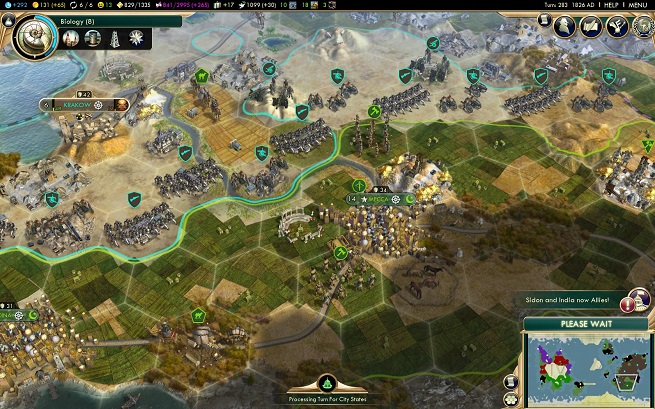
Above: I prepare to conquer Poland.
The tactical A.I. is still a sack of potatoes
For a short while, I thought my computer opponents were actually behaving accordingly. I saw ranged units tucked behind frontline soldiers and protected from attack. I saw siege weapons employed against cities and entrenched enemies. But then I watched the hundred-year-long assault of Quebec City, a lowly city-state, by the militarily superior Mongolian empire.
Since I’d paid handsomely for Quebec’s loyalty, I could see everything unfold in its territory. Although I didn’t want Genghis Khan to conquer the city-state, I also did not want to enter direct conflict myself since I had a declaration of friendship with the Mongolians. I decided to fight a war of proxy by gifting units to Quebec in hopes of stemming the Mongolian tide. Oh, how I was mistaken.
I first sent a knight, which is a fast attack medieval soldier perfectly suited to take out slow siege weapons, and Khan had situated several trebuchets around Quebec. I watched in horror as Quebec ordered the knight to its death by running it directly toward one of Khan’s cities. Next, I sent some swordsmen, which Quebec promptly fortified outside of the city, doing exactly nothing with them. Khan bombarded the unit into smithereens. Needless to say, standing by as Quebec used my gifted soldiers so ineffectively was goddamn infuriating.
But even that wasn’t the A.I.’s worst showing. After bringing Quebec to its knees, Khan failed to march a unit into the defenseless city and claim it for his own. Instead, I watched him retreat for no apparent reason at all.

Above: An archaeological dig site.
Ideologies are just another grab bag of inconsequential, random bonuses
When you reach a certain point, Brave New World unlocks ideologies in the social policy system. You can choose between freedom, order, and autocracy; you might recognize these as they were once mutually exclusive social policy branches. You spend culture to unlock new bonuses just as you do with social policies, but the progression tree for ideologies is much larger and is customizable.
By making these policy branches into ideologies, Brave New World lets you swap out to a different one if things aren’t working out so well. In this case, that means that your nation is unhappy, but as I’ve mentioned already, maintaining happiness isn’t really an issue. Ideologies seem to be trying to find the halfway point between Civilization IV’s completely adaptable civics system with Civ V’s hard, permanent choice social policy system.
But ideologies just aren’t that flexible, and I don’t think you’re going to find yourself in situations where you could change ideologies at an opportune time. The bonuses that are on offer are no better than the odd grab bag of minor benefits from Civ V’s religion system, which are likewise extremely circumstantial and hardly game affecting. Ideologies feel more like an afterthought than a core mechanic.

Above: The new trade route system.
Conclusion
The first 100 turns or so of a Civ V game hold that magic of the better prequels in this series — so full of exploration, discovery, mystery, and chance. It doesn’t hurt that the animations are beautiful and the attention to detail gorgeous; at times, I’d start a war just to see rockets fly or swords clash.
But as the game progresses, it quickly devolves into the same cycle of rote resource accumulation of filling culture and gold and science and tourism and faith and happiness buckets. That’d be all right if their buildup wasn’t a surefire thing you could depend upon. Sometimes Civ V feels like it’s on autopilot, which isn’t the hallmark of a strategy game worth your time.
Score: 50/100
Civilization V: Brave New World releases for PC on July 9. Publisher 2K Games provided GamesBeat with a prerelease Steam code for the purpose of this review.
VentureBeat's mission is to be a digital town square for technical decision-makers to gain knowledge about transformative enterprise technology and transact. Learn More

